Hail, Caesar! part 6
At the half-way point of the narrative, Hail, Caesar! introduces a new major character, Burt Gurney, seen on the set of a service-comedy-musical, performing a long, complex tap routine with a group of sailors, to a song called “No Dames.” In the context of the number, Burt and his crew are going to sea for eight months and will be without women and with little to do. Gay joke aside, the number is nevertheless a piece of foreshadowing for Burt’s eventual fate, a sunny Hollywood version of a story that hasn’t happened yet. There is no biblical subtext to the number that I can divine, but Hail, Caesar! doesn’t seem to be that adamant about laying on the Christian symbolism too heavily. Hobie Doyle’s movie, for instance, has no biblical subtext either, beyond a kind of Manichean good-guy-bad-guy reading of human interactions. Like Hobie’s movie, and DeeAnna’s mermaid picture, the “No Dames” sequence relishes the pure visual joy of bodies in motion, shifting patterns and colors.
(Also like the other movie-within-a-movie scenes, “No Dames” is presented as though being shot in sequence, live on a soundstage. In this way, Hail, Caesar! becomes a movie about itself, a movie that lies to us about how movies are made while on the way to telling us about how movies lie to us.)
After dropping of the ransom cash behind an electrical box, Eddie Mannix goes to talk to Arne Seslum, the German director of the Burt Gurney musical. Eddie wants Arne to marry DeeAnna Moran, the pregnant mermaid, but Arne, he learns, is already married, with two children, back in Germany. He also, oddly, briefly interrogates Eddie about his interest “physical culture,” namely skiing, and then hugs him. Eddie is shaken and embarrassed by the conversation — for a guy who dresses like a private detective, has the build of a boxer, regularly slaps people and makes musicals and westerns, Eddie isn’t comfortable with himself physically. (There is also, for a couple of reasons, the implication that Arne, despite being married, having two children and “probably” being the father of DeeAnna’s child, is gay. When DeeAnna complains that none of her boyfriends are “reliable,” she might be referring to Arne’s inconstancy in this regard.
Baird Whitlock, meanwhile, is still a comfortable hostage in the seaside house with the communist writers. They all like and admire Baird, because he is, after all, a movie star, the only unassailable quality one can have in the world of Hail, Caesar! They sit him down and explain to him who they are: screenwriters, who have written some of Capitol Pictures’ biggest hits. They wrote the scripts but do not share in the profits. It’s odd that the Coen Bros, who are nothing if not two of the industry’s most in-demand screenwriters, would depict underpaid screenwriters as idiotic ideologues, but the world of Hail, Caesar! presents, as I’ve noted, a status quo where everyone seems to be more or less absurdly happy. They try to get Baird to see himself as an exploited worker, to see Capitol as a capitalist nightmare run amok. They pride themselves for getting communist content into motion pictures — “always in a sub-rosa way, of course,” creating a mayor named “Gus” after perennial Communist Party leader Gus Hall, for instance.
The implication is that these communist writers are nothing but a group of whiners who know nothing of the struggle of the working class. Which is, undoubtedly, true, in the context of Hollywood in 1951. We see, in Hail, Caesar!, no exploited workers. No actor, dancer, electrician, focus-puller, clapper-loader, best boy, messenger or fish-ass maintainer is abused, ignored, underpaid or unhappy in their job. After all, the problem with communist writers in Hollywood in the 1950s is not that they were communists — no one cared if they were communists — but that forces in Washington made a big deal out of it. As we saw earlier in the season that Hail, Caesar! was released in, in Trumbo, communist writers were essentially harmless hipsters who presented no threat whatsoever to the status quo. The Stanford professor whom the communist writers turn to for their ideology, for instance, believes that kidnapping Baird and ransoming him back to the studio will “accelerate the dialectic and hasten the end of history and the creation of the New Man.”
Baird, who is an idiot’s idiot, nevertheless is able to morally dismantle the communists’ plot in nothing flat. As the linchpin of their plan, he says, he should, by their rules, share in the ransom. Otherwise he, himself, is being exploited for the value he’s created by his work, only for a different master.
His ransom money delivered, Eddie goes to see Sid Siegelstein, who runs the business affairs office at Capitol. Eddie has an idea, for DeeAnna Moran to disappear for a few months, have her child, then return as a single mother who has adopted a child, which no one needs to know is her own. Sid, who, by all rights, should be a practical, pragmatic soul, is startled, intrigued and excited by Eddie’s newest storytelling pitch; it brings new light and life to his world. While Eddie entertains the world with his Technicolor dreamscapes, he keeps Capitol afloat with another set of stories, stories that create make-believe in the midst of real life. In these fictions he crafts, Baird Whitlock is a “decent family man” instead of a drunken womanizer (with even darker secrets in his past), Hobie Doyle is dating Carlotta Valdez (whom he hasn’t even met yet), and now DeeAnna Moran is a woman blazing pathways by adopting a child, instead of a woman who’s slept with so many guys she’s not sure which one is the father.
Eddie does some quick detective work with his secretary Natalie regarding the extras on the set of Hail, Caesar! ATOTC, then goes to check in with C.C. Calhoun, the editor of Hobie’s new society comedy Merrily We Dance. As a subtle joke, the montage of “getting the film ready to view” clips is, by far, the most “edited” scene in the movie. After watching so much of Hobie’s struggles with dialogue on the set with director Laurence Laurentz, we can’t wait to see how Hobie is going to fare in the finished product. The Coens raise the suspense to Hitchcockian levels by having C.C. Calhoun almost strangle to death, Isadora Duncan-style, on her editing machine, which fouls the footage. Once it is set right, however, we see Hobie’s big scene play out, and find that C.C. has put together a smooth performance, and that Laurentz has lost his battle of dialogue. The line Hobie couldn’t say — “Would that it were so simple” — has been replaced by Hobie saying “It’s complicated.” The “rueful laugh” that Laurentz asked for is changed to a rueful glance. Hobie has taken a verbal character and turned him into a physical character. Laurentz has lost his battle for erudition, but Hobie reminds us why movie stars were movie stars — they knew, understood, at a cellular level, what the camera sees and how to respond to it. The knowing grin Hobie flashes at the end of the clip is all you need to know about his skill as an actor.
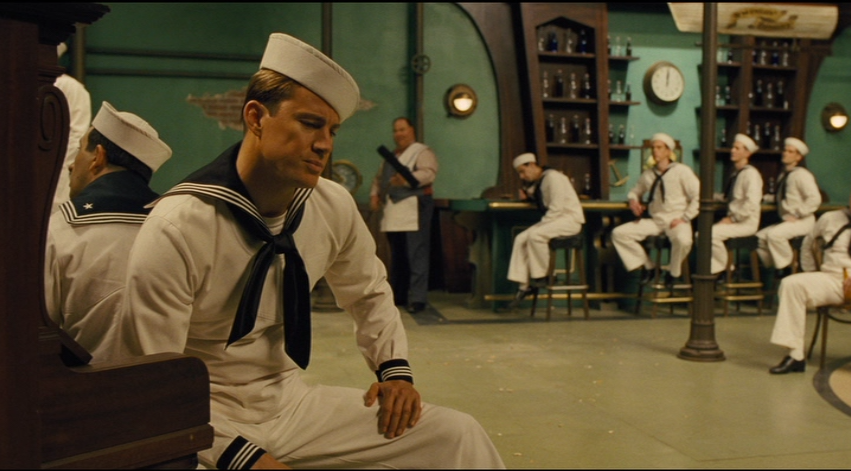
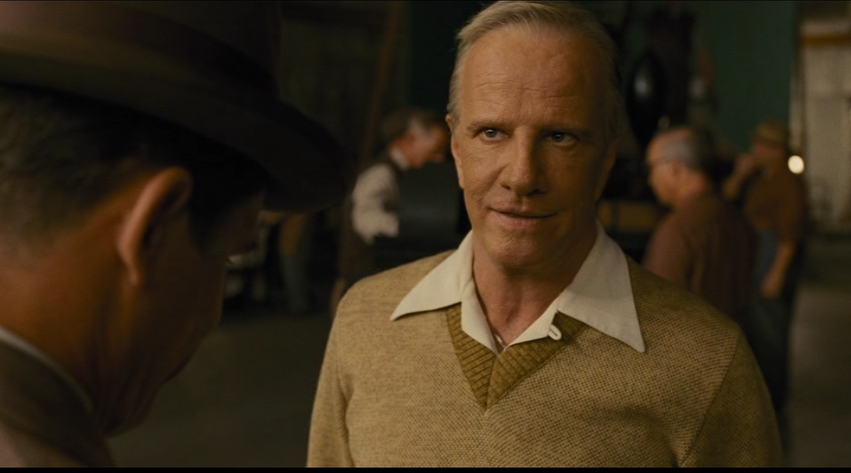
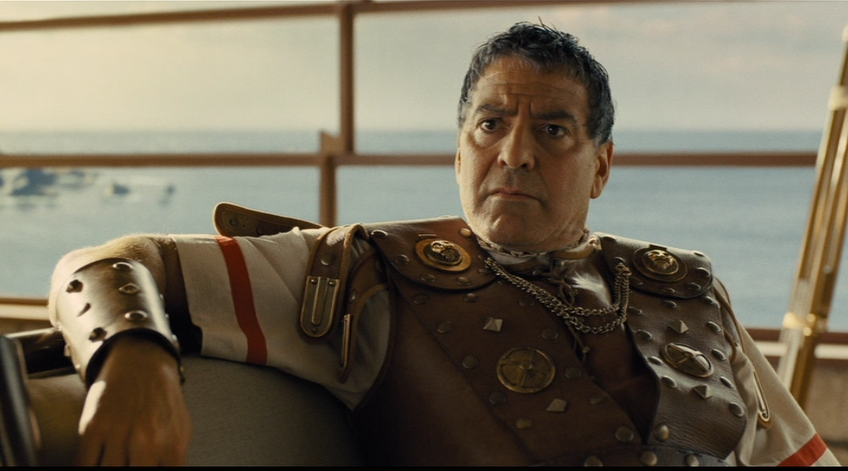
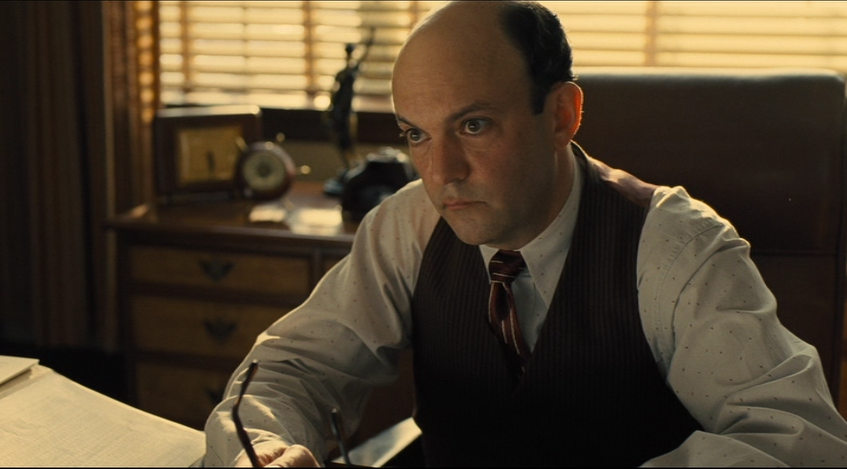
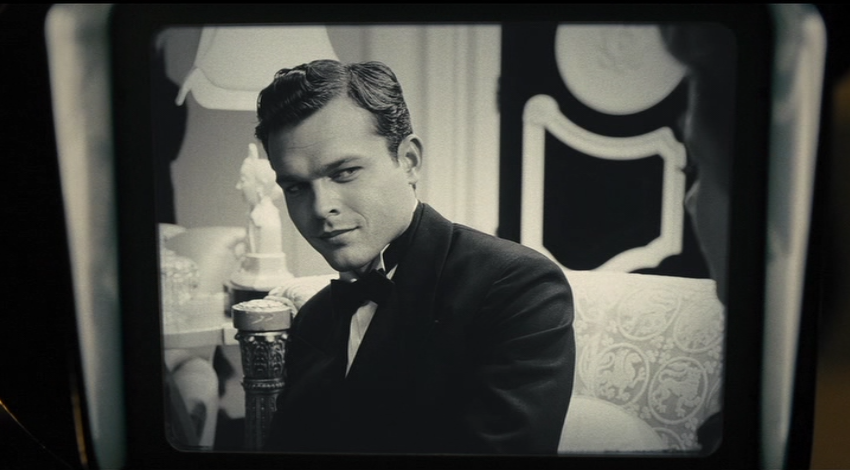
The friend I saw Hail, Caesar! in the theater with misunderstood the editing scene; he thought that when McDormand’s editor almost strangled and accidentally burned the film, instead of only burning one frame (which was clear to me only because that’s how it’d really work), the footage of Doyle’s performance of the line that’d been giving him trouble was burned away, thereby improving their movie with an accidental edit. My friend and I agreed that his misunderstanding might’ve been a better joke.
Rewatching it, just noticed a nice little gag when the barman points to Burt Gurney and tells him “you, out”. The smirk on Gurney/Tatum’s face is something to relish.